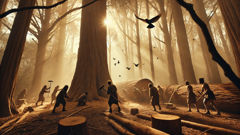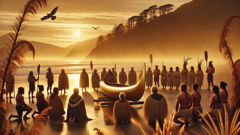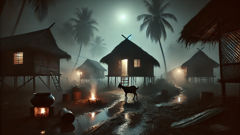Introduction
The forest breathed like a sleeping thing. Light sank through the high crowns of pūriri and tōtara in thin, gold fingers that painted motes of dust and flying insects into brief, jeweled moments. At the heart of that living cathedral, where ferns softened the footfalls of those who dared to pass, stood a tree so old its rings had mapped storms and summers that no one living could remember. Villagers called it Te Rākau Nui — the Great Tree — and their elders told its story beside fires when the tide was low. To them the tree was more than timber; it was an ancestor, a voice in the wood and an oath-bound pillar in the conversation between humans and the gods. Rata listened to those stories; they sat in his bones like seeds. Yet the ache in his chest for his missing father, chief of a distant iwi who had sailed beyond the horizon and not returned, made his own counsel thin and brittle. He wanted a waka — a canoe fit to cross the wide skin of the sea and bring his father home or, if fate had been cruel, to find his bones and give them a proper burial. In the hush of dawn he walked past the houses of his people, past woven flax drying on the racks and nets still glistening with salt, and into the hush of the forest, where the smell of damp earth and resin filled his nostrils. He had strength; he had skill; and he had, he believed, the right urgency to do what must be done. He did not ask. That omission, small in his mind, set the stage for a lesson as old as the trees themselves, for in the world of the living islands, nothing was taken without song, and nothing was built without thanks. Rata's story is not only about a single tree; it is about boundaries, about how to speak to what sustains you, and about the subtle, patient power of living things that will not be bullied into service. It begins with a stroke of an adze and the quiet that followed — a silence that was not empty, but listening.
The Taking of the Tree
Rata's hands were calloused from ritual and work; the adze felt familiar and faithful in his palm. He had shaped marae posts and carved toki for the elders, and every strike had been a prayer. But that morning, urgency sharpened each blow into something else: a promise hammered into wood with no word of gratitude to the forest that held the tree upright. He chose a mighty tōtara, its trunk wide enough that ten men could not embrace it. In the ringed heart of the great tree glowed evidence of seasons — places where lightning had kissed the wood and where birds had nested, where sap had made paths like apprentices of silver. If the living world kept a ledger, that tree's entries would have started before the first canoe's prow had broken the wave. Rata set his adze and began. The first cuts sang. Bark dusted his shirt like confetti, and the sound of wood yielding to metal seemed for a moment to be music: blunt, honest, and quickly lost.

The forest watched. It always does. Leaves shifted as if to look, and a small wren hopped nearer to the clearing to watch the thrumming, as if waiting for a confession. Rata worked until the sun leaned west and the cut deepened. He was thinking of wind and sea, of the sound of distant surf and his father's voice carried on it. He did not chant a karakia. He did not sprinkle water or speak to the roots. He was too hungry for action. When at last the great tree fell with a sound like a mountain giving up its bones, it made a hollow bell of the valley. The birds scattered in one living cloud; even the shadows seemed to startle. The men of the village cheered and carried rope and chain and laughed like boys who had found a secret. They rolled the trunk out of the place where it had stood for generations, and for three days they labored to strip the branches and shape the keel that would become a canoe.
But the forest kept its appointment with memory. Night after night, as the village slept and the tiki and hei adorned necks gleamed cushion-soft from the day’s firelight, a quiet company gathered. They were not seen by everyone. They were the hākuturi, the guardians of the wood — small, quick creatures like the shapes of saplings that had learned to move, with leaves braided into hair and eyes like green seeds. They were cousins in some stories to the taniwha and cousins in other stories to birds; names and shapes shift with telling, yet their heart is the same: guardian and avenger. Under the moon they came to the felled trunk. They saw the fresh wounds, the carved adze marks, and they whispered among themselves with the sound of brown leaves. The hākuturi consulted the older spirits — the shade of Tāne Mahuta who watched with a patience that was older than the naming of things. There was no malice in their decision; there was only a rebalancing. Before dawn the hākuturi set their hands to the sleeping wood and began to reclaim what had been taken without song.
When Rata and the men returned to take the canoe back to the village, they found the keel in place but the tree whole again, upright and proud where it had stood. Bark that had been stripped was smooth and seamless. Even the adze marks were gone, as if the wood had simply never known the touch of metal. Some men fell to their knees. Others said the sea had taken the canoe and then returned it. Rata felt a cold place open in his chest. Anger at loss flashed like a struck stone and then melted into something more perplexing: shame. He remembered the unspoken ritual, the songs he had skipped in his haste. But shame alone does not change the world. He beat his fists on the bark and called names at the trees; his voice sounded small against the broad green shoulders. The elders shook their heads and told him of laws older than his father's canoe: you do not take from Tāne without karakia; you ask and you give; you make space for the forest's will. Rata listened, but listening is a seed that needs time and water. He had little patience left, so he set the adze again.
The hākuturi, hidden in moss and shadow, watched the human’s persistence with a kind of sorrow. They did not wish harm but they could not allow violation to pass. The next morning, there was no tree at the spot where it had been; instead there was a smooth canoe laid upon the earth, polished and ready, and in the cup of its hollow many feathers had been woven like prayer flags. Rata's heart leapt at the sight, but pride and confusion boiled into triumph and something else — a fleeting hope that effort alone could shape destiny. He reached to take the canoe and lift it toward the sea. As his hands touched the rim, a wind arose, smelling faintly of resin and kelp and the breath of distant breakers, and in that wind the forest gave a voice. It was not loud. It was an accumulation of small sounds: the creak of a branch, the sigh of leaves, an old chant sounding in the shape of the wind. The voice told him he had not asked. That the tree had been given freely to no hand that had not first convinced the forest it would be honored. Rata's fingers slid from the canoe. He stepped back. The men around him muttered and wanted the sea, so they argued for force. But force bends things and breaks things; it does not repair covenant. The hākuturi, unseen, came forward and with hands as sure as tide and as gentle as dawn, they set the canoe back into the trunk that had birthed it. Wood closed around wood as if hugging an old wound, and where the canoe had been there was, once more, a whole tree standing with the dignity of someone who had been returned to their own skin. Rata stood in the hush like a man from whom the tide had been taken. In the emptiness where a canoe should have been, he felt a new understanding pressing against his ribs — asking was not a litany of weakness; it was a bridge. To the forest, to Tāne, to ancestors and spirits, a request is not only politeness; it is recognition of shared life.
That night he could not sleep. He walked to the edge of the clearing where the tree stood like a watchman and sat with his forehead against its trunk until the bark was familiar under his skin. He thought of his father and of the sea and of the many small rituals he had ignored. He thought of the elders' words and the hākuturi's work. When the first bird called, he began to sing. The song was simple and rough at first — a boy's apology more than a man's oration — but sound shapes the air. He spoke aloud to the tree, to Tāne, to the spirits that had labored in the quiet hours. He offered taro from the storehouse and wove a small waka in miniature, a thing of flax and soft wood to signify his intent. He promised care and space and the laying of oil and the chanting of karakia should the forest choose to yield. The forest listened, not like an audience waiting for applause, but like an elder evaluating sincerity. Rata's sincerity was raw enough to be believed, and belief, when tended, makes a new place to stand.
A Lesson in Respect
When the elders saw how Rata had opened himself, even if only by knotted and halting words, they agreed to teach him how to mend what had been broken. It is easy to say apology; it is harder to rebuild covenant. For three days and three nights the village gathered, and the elders spoke of karakia and ritual and the right gestures to soothe a wounded forest. They taught him to bring water in a carved shell and to lay it at the roots, not casually but with the steadiness of one who returns to a lover who has taken offense. He had to learn the names of the birds that nested in the tree and the plants that grew at its feet; to look strangers in the eye and then to say the tree's name aloud as if it were a living person, because in the world they inhabited, naming was invitation. Rata learned to hold a flax cord with both hands and to let the silence between words be as meaningful as the words themselves.

Even so, learning alone would not be enough. The hākuturi demanded action, not simply recitation. They wanted to know that the canoe he hoped for would be a canoe to honor life rather than to seize it. He had to offer back; a tree taken must be paid in service and song. He planted small shoots at the place where the felled tree had stood, not as a gesture of atonement to be forgotten, but as starting points for a forest that would, in time, give life to others. He vowed to teach the children of the village the old chants, the songs to be sung before a blade touches bark, and to sit with the elders through seasons of teaching until the songs were threaded into his bones. He learned the slow art of waiting. For a man whose pulse had been set to the rhythm of immediate rescue, waiting felt like punishment. But the hākuturi used time as the sea uses input and outlet: a ruler of recompense.
One moonless night, as he sat in the place where the great tree had always been, he heard laughter in the leaves — not cruel, not mocking, but bright as ripples on a stream. The hākuturi presented themselves, no longer hidden, in forms both human and not. Tiny hands worked on a small, perfect canoe as if demonstrating what a life-gifted vessel should look like. They showed how to place planks so that the wood's grain followed the flow of water, how to sew the hull with the sinew of care, and how to ask the sea to receive rather than dominate. They entrusted to him a chant older than any name the village spoke aloud and said he might use it when the canoe touched salt. But they also set a test, as the ocean sets tests in morning tides: Rata must carve a figurehead not of his likeness or of victory, but of his father’s memory — not to bind the spirit but to honor it. He set to work.
This time, he carved with song and not with haste. Each shaving from his blade was offered like incense. He whispered the names of birds, of ancestors, of rivers that knew the way to the sea. The adze moved in a rhythm that matched the chant. When the hull was shaped and the ribs were sweat-fitted, the elders and the hākuturi came together at dawn, weaving nets of flax and feather and blessing the waka with oil. They rubbed the canoe’s belly with resin and sang the long karakia that made a canoe an instrument of connection rather than a weapon of taking. The ritual required more than a single morning; it required seasons and attention. The village gathered stories of safe passages and of the tragedies that come when the ocean is asked but not heeded. Each story was a stitch in a broader net — a network of careful telling that would help hold Rata when he would later set out to sea.
With every stitch and chant, Rata felt the shape of his urgency change. He began to understand that courage is not always the paring away of fear but often the patience to make promises real. He had thought strength was measured by how fast a tree could be felled or a keel made. He had to learn that strength can also be the willingness to be small before greater things, to bow and ask and then to act with care. The hākuturi, seeing his commitment, gave him a boon: at the canoe's prow they carved a small face, not hollow, not monstrous, but simple, with eyes that seemed to hold a remembered sea. When Rata carved his father’s name and laid some of his hair inside the woven timbers, the elders hummed low and the forest exhaled as if pleased. Even the birds quieted to listen.
The day the waka was finally ready, the whole village walked with him to the beach. Women wore cloaks and men bore paddles, the children carried shells and small green branches as offerings. All the ritual that had once seemed like a barrier now felt like a map: each knot and each chant had oriented them toward the sea patiently and with humility. When he slid the canoe into the water, the hull accepted the sea as if it had been born for that purpose. Rata knelt and intoned the karakia the hākuturi had taught him, his voice a thread that drew sky and salt together. A flock of tītī came screaming from offshore, the sound like a blessing. Waves lapped and the prow answered them with a soft, respectful cleaving. The elders touched the canoe and blessed it with their names and stories; they told Rata that the voyage would be a learning in itself, that crossing water is a conversation where storms sometimes speak in anger and sometimes in sorrow, and that he must always remember to give thanks.
Out at sea the wind found them. Rata felt the strength of his men and the fragile resilience of the boat he had earned. He steered by the sun and the birds, by stars learned from elders and by the soft tilt of the ocean. He remembered the tree that had stood for ages and the many little lives it had sheltered. He remembered the hākuturi’s hands closing the seam where the canoe had once been, and how the forest had taught him that to take without asking leaves a wound not only in wood but in the fabric that ties people to place. On long nights he spoke the songs taught at the clearing to steady himself, adding his own verses that promised to teach others the old ways: to ask, to repay, to plant, to tend. By the time he found traces of his father's route — broken net, a carved adze washed ashore, a small woven cloak tangled in kelp — Rata no longer wanted the journey to be only about retrieval. It was a pilgrimage of reciprocity. Whatever the sea had returned, he would honor with rites and with the planting of many more trees.
When Rata finally returned to the village, he had changed. The man who came back was not merely a son who had reclaimed family bones or memory but a man who had learned to make promises to the earth and keep them. He taught the village the songs he had learned under the trees and with the hākuturi, and he started a tradition that the first blow upon any tree would be a chant and an offering. In carving the prow, he had learned to carve not only wood but a consistent life: one of asking and answering, of respecting the older voices that keep balance. The story of his mistake became a teaching, not a shameful tale told to privately scold and humiliate but a living lesson recited by children sitting with noses to the fire as much as by chiefs negotiating trade and marriage. The waka lasted for many seasons and brought people together as much as it carried them across water. The forest, in turn, was not implacable; it continued to give, because it had been asked rightly. The hākuturi still roamed the underbrush, sometimes leaving little gifts of polished seeds or a shell at a threshold, reminders that they watch and that they will act when the balance is broken.
Respect, Rata learned, is a kind of reciprocity that requires remembering you are part of a circle. You ask because you are not above the living things that give you life; you offer because receiving empties the world if you take without sowing back. The hākuturi's restoration of the tree was not a punishment in the way men understood punishment; it was a way to re-teach the order of giving and receiving. That lesson, carved into the memory of the people, kept the village from the reckless clearing of forests and taught generations how to travel the ocean with care. In this way, the forest and the village both continued to thrive, and Rata's name passed through the years as a story of learning, humility, and the patient, reciprocal song of island life.
Conclusion
Stories like Rata’s survive for the same reason carved grooves survive in the heartwood of trees: they are needed. They remind people of the tender, exacting ways the world expects to be treated. Rata had wanted a canoe because his family needed one; the forest, in turning the canoe back into a tree, was not cruel but exacting in its insistence that relationships be honored. He came to understand that speed can be theft, and that asking, giving, tending, and teaching are the bones of lasting communities. The lesson is practical and spiritual: plant where you have felled, sing for what you take, and do not assume the land exists only to be used. The hākuturi and Tāne are not merely mythic characters but voices of a worldview that measured success by more than trophies: by the continuity of forests, by the safe return of voyagers, and by the children who would know how to speak before they cut. In that knowledge, the villagers learned to shape canoes that were not only seaworthy but soul-worthy. Rata’s story travels still, told on nights when the tide mirrors the stars and when elders press children close to the warmth of the fire. It is a story that asks less about right and wrong in a single action and more about how to live in ways that make future actions less fraught: reciprocity over haste, ceremony over thoughtless taking, learning over pride. These themes translate across time and place because they reflect a simple human truth — that we cannot remain whole if we hollow out the world that holds us. Rata returned with the sea’s stories and the forest’s patience, and by keeping both, he kept something of his own humanity. His canoe carried him to and from the edges of the map, but it was the steady work of learning and reparation that kept the village and its surrounding forest singing for generations.


















